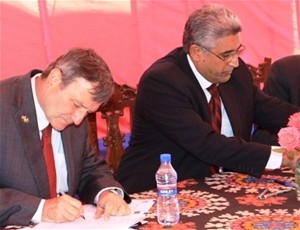
U.S. Ambassador Karl W. Eikenberry (left), Minister of Agriculture Mohammad Asif Rahimi (center), and USAID Acting Mission Director Kevin Brownawell sign a Memorandum of Understanding inaugurating the National Seed Distribution Program, a USAID-funded pro
IRD/AVIPA Plus
USAID helps Afghan farmers achieve better wheat harvests in 2011.
6 NOVEMBER 2010 | KABUL, AFGHANISTAN
For decades, Afghanistan has relied on imports from its neighbors to meet its requirements for wheat and other commodities. However, with reduced wheat harvests in Russia and Pakistan and food prices rising around the world, the key to Afghanistan’s food security for the future is self-reliance.
In close collaboration with the Afghan Ministry of Agriculture, Irrigation and Livestock (MAIL), a new USAID-funded project is helping 260,000 Afghan farmers increase their wheat production for 2011. The program will provide 13,000 metric tons of certified wheat seed and nearly 40,000 metric tons of fertilizer to farmers in 31 of the 34 Afghan provinces. Farmers will also receive training in wheat seed production to help them maximize their harvests. These inputs could yield nearly 300,000 metric tons of wheat on an estimated 500,000 jeribs (100,000 hectares) of land.
U.S. Ambassador Karl W. Eikenberry was on hand to deliver the first bags of seed and fertilizer to farmers participating in USAID’s Afghanistan Vouchers for Increased Production in Agriculture (AVIPA) Plus National Seed Distribution Program. “The U.S. government is committed to supporting MAIL to strengthen Afghanistan’s agricultural sector overall, and to ensure Afghan food security with a thriving wheat sector,” said Ambassador Eikenberry.
In collaboration with local shuras, the MAIL selects beneficiary farmers that receive vouchers for 50 kg of wheat seed and 150 kg of fertilizer for a 35 percent co-pay. The program is aimed at small commercial farmers in underserved regions.
“Small commercial farmers produce more than 80 percent of the total agricultural output,” Eikenberry said. “They are the mainstay of the wheat sector.”
Mohammadullah, a farmer from the Qarabagh District of Kabul, was one of 32 farmers to receive seed and fertilizer at the inaugural event. He is a member of his village shura and has seen agriculture decimated by years of war and drought. “It’s great that America is helping Afghanistan in so many ways, but help is especially needed in agriculture,” he said, loading bags of seed and fertilizer into the back of an old truck. “This will help the economy develop, and through that, security will improve. A country that is hungry can never be safe.”







Comment
Make a general inquiry or suggest an improvement.